democracynow.org
Stories:
 Protests Erupt in San Juan as Obama Forms Unelected Control Board to Run Puerto Rico
Protests Erupt in San Juan as Obama Forms Unelected Control Board to Run Puerto Rico
President Obama has appointed seven members to a federal control board that will run the finances of Puerto Rico’s nearly bankrupt government for at least the next five years and restructure nearly $70 billion in debt. The board is made up of three Democrats and four Republicans who will not only approve any budgets created by the island’s politicians, but also attempt to negotiate with the island’s nearly 20 creditors. On Wednesday, hundreds of protesters in Puerto Rico blocked a street in front of a hotel where bankers and business executives were gathering for a conference hosted by the Puerto Rico Chamber of Commerce. Meanwhile, a new report from the ReFund America Project has revealed firms like UBS, Citigroup, Goldman Sachs and Barclays Capital have collected $1.6 billion in underwriting fees from Puerto Rico since 2000 just for refinancing bonds to pay interest and fees on older bonds.
TRANSCRIPT
This is a rush transcript. Copy may not be in its final form.
JUAN GONZÁLEZ: President Obama has appointed seven members to a federal control board that will run the finances of Puerto Rico’s nearly bankrupt government for at least the next five years and restructure nearly $70 billion in debt. The board is made up of three Democrats and four Republicans, who will not only approve any budgets created by the island’s politicians, but also attempt to negotiate with the island’s many creditors.
On Wednesday, hundreds of protesters in Puerto Rico blocked the street in front of a hotel where bankers and business executives were gathering for a conference hosted by the Puerto Rico Chamber of Commerce on the new PROMESA bill, as it’s called, the congressional legislation that was passed two months ago. Democracy Now! correspondent Juan Carlos Dávila was there in San Juan.
JUAN CARLOS DÁVILA: The black-and-white flag of Puerto Rico has become a symbol of resistance, resistance against U.S. colonialism. This flag has been adopted by the movement Se Acabaron Las Promesas, Promises Are Over, which called for a protest to shut down the first PROMESA conference on Wednesday morning.
XIOMARA CARO: My name is Xiomara Caro. I am a lawyer and communicator and an activist. And I am an organizer for the group Promises Are Over, Se Acabaron Las Promesas. And the reason we have started to organize in Puerto Rico—and this is a continuation of many other social movements—is Puerto Rico is right now in a political and economic crisis.
JUAN CARLOS DÁVILA: On Wednesday morning, protesters holding wooden shields faced off the police as they attempted to block the entrance of the Hilton Condado Plaza, where the Chamber of Commerce of Puerto Rico was expecting hundreds of businessmen and women to discuss the Puerto Rico Oversight Management and Economic Stability Act.
POLICE OFFICER: [translated] At this time and for your security, you must head to the sidewalk now.
GABRIEL DÍAZ RIVERA: [translated] My name is Gabriel Díaz Rivera. We have been here since 6:00 a.m. blocking the entrances to the Condado Plaza Hotel. This is the second warning they’ve given that they will remove us in order to protect the conference for the rich, who have been making our lives precarious and making the lives of working people of this country precarious, as well. And we will stand firm here, blocking the entrances, because this conference is not accepted. We are convinced that the fiscal control board is not accepted, and we are not going to accept it.
KARLA PESQUERA: [translated] My name is Karla Pesquera. We have managed to close the way to the participants in this first conference of PROMESA, the first conference to be held here in the Hilton Condado Plaza Hotel. Quite simply, we have blocked the passage. Many of them have tried to go through an entrance, but we managed to gain territory, and here we are preventing their passage.
JUAN CARLOS DÁVILA: Eventually, Puerto Rican police officers escorted some of the participants into the hotel past the protesters. René Reyes spoke about what happened.
RENÉ REYES: [translated] We are here offering resistance at the Dos Hermanos Bridge in front of the Condado Plaza Hotel, where the first PROMESA conference is being held. And I am seeing how the Puerto Rican police, specifically the special arrest unit, is protecting the people who are trying to enter the conference, violating the picket line of civil disobedience we have organized here outside the hotel.
JUAN CARLOS DÁVILA: One of the participants of the first PROMESA conference, who did not want to identify himself by name, spoke to the press and expressed his disappointment about the protest.
CONFERENCE PARTICIPANT: I came to see the PROMESA conference that’s going on. I’ve actually made a great sacrifice to come here. I’m not—I’m not rich. I’ve worked hard, and I’ve made—I’ve made a choice in my life to move away from my family to come here to try and create jobs, to invest in Puerto Rico.
JUAN CARLOS DÁVILA: Eventually, he was escorted by the police into the event.
EVELYN SEMIDEY: My name is Evelyn Semidey. A lawyer representing the Cámara de Comercio de Puerto Rico just served everyone, just served Jocelyn Velázquez y otros. This "y otros" means that she just served everyone on this side of the fence, on the other side of the fence, on that side of the fence. Anyone that is standing here just got served to be in court in five minutes.
JUAN CARLOS DÁVILA: Despite a court citation, the protesters continued their action, challenging the court order as they built barricades to protect themselves from the increasingly hostile police forces. Several unions and civil society groups collaborated with the Puerto Rican youth to build a barricade. The police then provoked the protesters, and the situation escalated.
AMY GOODMAN: That report by Democracy Now!'s Juan Carlos Dávila. This is Democracy Now! To talk more about the situation in Puerto Rico and the financial control board, whose members have just been named, we're joined by Saqib Bhatti, director of the ReFund America Project and fellow at Roosevelt Institute, co-author of a new report, "Scooping and Tossing Puerto Rico’s Future." And, Juan, you just wrote a piece in the New York Daily News about the control board. Explain who was just chosen.
JUAN GONZÁLEZ: Well, you know, it’s been two months since Congress passed a law, the PROMESA law, creating the fiscal control board, but President Obama, until yesterday, had not named the seven members of the control board, because there’s been, for the last two months, an enormous amount of behind-the-scenes jockeying and negotiations between the White House and the members of Congress over who will be the members of this board, which will basically be running the island of Puerto Rico at least for five, possibly for 10, years. And it’s a complicated group. It had to be four Republicans that Obama chose from a list provided by Speaker Ryan and Majority Leader Mitch McConnell in the Senate, and then three that the Democrats chose, one from a list from Nancy Pelosi, another from a list from Harry Reid, the minority leader of the Senate, and the president got to pick one of his own. And because there was enormous pressure on the administration over the fact that this was an imposition of a control board, they agreed that they would try to come together to at least have a majority of the seven members to be of Puerto Rican origin. So, what ended up happening was a convoluted situation to how you put these seven together.
And so, Obama finally announced yesterday afternoon the members. They include two Puerto Ricans from the island, but both are conservative Republicans named by the Republicans. The Puerto Ricans that the Obama administration named are Puerto Ricans who basically live in the United States. One, Ana Matosantos is a—was a key aide to Governor Schwarzenegger and to Jerry Brown, a budget expert from California. Another, José González, is a Puerto Rican who is the president of the New York Federal Home Loan Bank, but who also has ties to financial institutions here in the United States and was the director of Banco Santander, chief executive of Banco Santander. And they chose also Arthur Gonzalez, who’s not very—he’s a Cuban American, who is not well known, but he was the chief judge of the U.S. Bankruptcy Court for the Southern District of New York. So, there are actually five Latinos on the seven-member board, four of them of Puerto Rican origin.
But it’s still a U.S.-imposed board. And in Puerto Rico, there’s enormous concern over how the—what this board will do to reduce living standards in Puerto Rico, to trim the budget, as well as to renegotiate the debt. And, of course, Wall Street is most concerned about how this debt gets renegotiated. And that’s why the report that I mentioned in my column yesterday that the ReFund America Project has put together is so important, "Scooping and Tossing Puerto Rico’s Future." And I’d like Saqib Bhatti to talk about the main findings of your report, especially how much of this debt that Puerto Rico has is really illegitimate debt, a gouging by many of the Wall Street firms.
SAQIB BHATTI: Juan, we’ve been doing a series of reports looking at the legitimacy of Puerto Rico’s debt. And what we’ve found is that over the course of the various reports we put out, thus far we’ve identified $37 billion in debt that we believe to be illegitimate.
In this report, in particular, we look at Puerto Rico’s "scoop and toss" deals. That’s basically when banks convince Puerto Rico to keep refinancing the same debt over and over again in order to avoid making payments. This is called scoop and toss because you’re scooping up the debt that’s due today and tossing it years into the future, kicking the can down the road. But banks did this because they got to charge exorbitant fees out of it. And so, you know—and with Puerto Rico’s "scoop and toss" deals since 2000, banks like UBS and Santander charged $1.6 billion in issuance fees. And this $1.6 billion comes to be counted as part of Puerto Rico’s debt. And we think that’s illegitimate.
Similarly, there’s another $1.6 billion that these "scoop and toss" deals were part of, where they actually took out money to pay interest on other debt. And so, what they did is, in effect, interest payments came due, they didn’t have the money to pay it, so they put it on the credit card. And so, they’ll be paying interest on the interest. And so, in this report, we identified, again, $1.6 billion in fees, $1.6 billion in this capitalized interest, so it’s $3.2 billion in illegitimate debt just from the "scoop and toss" deals. In our previous report, we’ve identified a series of payday loans that Puerto Rico has entered into. So, altogether, the total thus far is $37 billion. And we know that number will keep going up as we look at—as we issue subsequent reports.
JUAN GONZÁLEZ: Well, one of the things that I was—most struck me about your report was the percentage that these banks were charging Puerto Rico in fees, compared to what the normal percentage in the securities industry is, that I think you had one example there of Barclays was a lead underwriter on a 2011 bond where they charged 9 percent of the total amount of money raised as their fees, when the normal fees are—nationwide, are 1 to 2 percent. So they were gouging Puerto Rico just on the fees of putting together the deal.
SAQIB BHATTI: That’s exactly right. One of the biggest problems with these things is that the reason why banks really pushed them was because they made huge fees off of them. As you said, nationally, we did a report last year that showed that the average for issuance fees on bonds is actually about 1.02 percent. In Puerto Rico, the average is 2.7 percent—almost three times as high as the national average. And again, there was that instance that you mentioned where Barclays charged 9 percent.
And what’s interesting about this is that this actually, just a couple of years ago, would have been illegal in Puerto Rico. Puerto Rican law did not allow bond issuance fees to be more than 2 percent until 2009. In 2009, there was a law that was passed, Public Law 7, which has also led to harsh austerity measures, massive layoffs on the island of government workers. And the other thing it did is it actually lifted some of the protections that Puerto Rican taxpayers enjoyed against Wall Street. And so, a particular thing it did is it allowed fees to be more than 2 percent. Prior to the passage of Public Law 7, these high fees could not have happened. But now we’re seeing Puerto Rico be charged through the nose. And it’s paying—frankly, it paid higher than cities, states, that actually had weaker credit ratings. So, while Detroit was slipping toward bankruptcy, its credit rating was junk; it was still paying lower fees than Puerto Rico was a couple years ago. And that’s outrageous.
AMY GOODMAN: Well, Saqib Bhatti, we will leave it there today, and we’ll link to your report, director of the ReFund America Project, fellow at the Roosevelt Institute. The report, "Scooping and Tossing Puerto Rico’s Future." And, Juan, we’ll link to your report, your article at the New York Daily News.
... Read More → Dilma Rousseff on Ouster: This is a Coup That Will Impact Every Democratic Organization in Brazil
Dilma Rousseff on Ouster: This is a Coup That Will Impact Every Democratic Organization in Brazil
The Brazilian Senate has voted to impeach the country’s democratically elected President Dilma Rousseff from office in what many are calling a coup. The vote was 61 to 20. Rousseff denounced the decision, saying there’s no constitutional justification for her impeachment. In an unexpected twist, the senators voted 42 to 36 to allow Rousseff to maintain her political rights, meaning she can continue to stand in elections and hold public office in the future. Irate opposition senators vowed "to appeal to the Supreme Court" to reverse the decision. Dilma Rousseff’s impeachment ends 13 years of rule by the Workers’ Party in Brazil and brings to power President Michel Temer for the remaining two years of Rousseff’s term. Temer is deeply unpopular and currently under investigation himself, accused of receiving illegal campaign contributions linked to the state oil company Petrobras. We speak to James Green, professor of Brazilian history and culture at Brown University. He is the director of Brown’s Brazil Initiative. Green is the author of several books, including "We Cannot Remain Silent: Opposition to the Brazilian Military Dictatorship in the United States."
TRANSCRIPT
This is a rush transcript. Copy may not be in its final form.
JUAN GONZÁLEZ: The Brazilian Senate has voted to impeach the country’s democratically elected President Dilma Rousseff from office in what many are calling a coup. The vote was 61 to 20. Rousseff denounced the decision, saying there’s no constitutional justification for her impeachment.
DILMA ROUSSEFF: [translated] They’ve just overthrown the first woman elected president of Brazil, without there being any constitutional justification for this impeachment. But the coup was not just carried out against me and my party or the allied parties who support me today. This was just the beginning. The coup is going to strike, without distinction, every progressive and democratic political organization. ...
They think they’ve beaten us, but they are mistaken. I know we are all going to fight. There will be, against them, the firmest, most tireless and energetic opposition that a coup government can face. I repeat, there will be, against them, the most determined opposition that a coup government can face. ...
This is not how this story ends. I am certain that the disruption of this process by the coup d’état is not final. We will return, just to satisfy our desires or wants. We will return. We will return to continue our journey toward a Brazil where the people are sovereign.
AMY GOODMAN: That was ousted Brazilian President Dilma Rousseff speaking shortly after Brazil’s Senate voted to remove her from office. In an unexpected twist, the senators voted 42 to 36 to allow Rousseff to maintain her political rights, meaning she can continue to stand in elections and hold public office in the future. Irate opposition senators vowed to appeal to the Supreme Court to reverse the decision.
JUAN GONZÁLEZ: Dilma Rousseff’s impeachment ends 13 years of rule by the Workers’ Party of Brazil and brings to power President Michel Temer for the remaining two years of her term. Temer is deeply unpopular and currently under investigation himself, accused of receiving illegal campaign contributions linked to the state oil company Petrobras. On Wednesday, Temer addressed the nation in a recorded television speech.
PRESIDENT MICHEL TEMER: [translated] I assume the presidency of Brazil after a democratic and transparent decision by the National Congress. The time is one of hope and of resuming confidence in Brazil. The uncertainty has come to an end. It is time to unite the country and to put national interests above the interests of specific groups.
AMY GOODMAN: Venezuela and Ecuador denounced the removal of Dilma Rousseff and recalled their ambassadors to Brazil. And massive protests rocked São Paulo for a third day.
For more, we’re joined by James Green, professor of Brazilian history and culture at Brown University. He’s the director of the Brown Brazil Initiative. Professor Green is author of several books, including We Cannot Remain Silent: Opposition to the Brazilian Military Dictatorship in the United States.
James Green, welcome to Democracy Now!
JAMES GREEN: Pleasure to be here.
AMY GOODMAN: What about the significance of the ouster of the first woman president of Brazil, of Dilma Rousseff?
JAMES GREEN: Well, it’s really part of a five-point plan that has been articulated by sectors of the opposition—first to eliminate the president from her office; then to find a way to make Lula, President Lula, ineligible for election in 2018 to the presidency; then to install a neoliberal economic policy; to diminish and eliminate all of the social programs that have been established in the last 13 years; and, finally, to turn back some of the progressive social measures that have been fought for by the LGBTQ community, women, the black movement in Brazil.
JUAN GONZÁLEZ: When you say there was a plan, well, clearly, the—this is only made possible by the fact that the Workers’ Party lost the majority in the Legislature of Brazil. How did that happen? How did it lose control of the overall government?
JAMES GREEN: So, the left generally has about 35 percent of the electoral support. So it always has to build a coalition in order to govern. And when Dilma was elected this last time by about 3.5 percent margin, the opposition immediately decided to carry out the same tactic the Republicans carried out when Obama was elected—basically, to obstruct everything that she was doing, and, at the same time, mobilize in the streets against her, using corruption investigation scandals as a motivating force in that regard.
There was then a move to remove from—the speaker of the House from the lower house of Congress, the Chamber of Deputies, Eduardo Cunha, from office. And when the Workers’ Party refused to support him, and actually voted against him in the ethics committee, he then mobilized his forces within the coalition that had supported Lula and Dilma to reverse their position and support Temer and the opposition. So there was a conjunction of both traditional forces who were against the electoral outcomes of 2014 combined with those forces in Congress who were very afraid that the Car Wash investigations, as they’re known in Brazil, would actually end in jailing many of the leading politicians of the country.
AMY GOODMAN: So they needed her out, so that didn’t happen.
JAMES GREEN: They needed her out. And this has been documented by some tapes that were recorded of politicians speaking about the situation. Because she actually has not been involved in any corruption. She is impeccable. She will return to a very humble two-bedroom apartment in Porto AlAMY GOODMAN: She had this powerful quote where she said, "This is the second coup I have faced in my life. The first, the military coup, supported by weapons of repression and torture, struck me as a young militant." She was jailed. She was tortured. This one they call the second coup. You write a lot about U.S.-Brazilian relationship. What was the U.S. involvement? Was there now? And right back to that first coup she talked about, that led to her jailing.
JAMES GREEN: There’s no question about U.S. involvement in supporting the coup in 1964, starting from, in 1962, Lincoln Gordon, who was the U.S. ambassador, through the CIA funding of $5 million in funds to support the gubernatorial candidates that opposed the president, João Goulart. In 1963, '64, the military attaché was involved in building alliances with the military, the Brazilian military, and gave them the green light, saying that if they overthrow the democratically elected government of João Goulart, that they, in fact, the United States, would support them. And Johnson, the day after the coup, endorsed the new government in power. So there's no question about that, and I don’t think any historians will argue differently at this point.
It’s not clear exactly to what extent the United States government is involved in supporting the opposition to Dilma Rousseff. At one point they publicly remained neutral; they said they wanted to allow the democratic process to go forward. President-elect—potentially President-elect Clinton is very close to Fernando Henrique Cardoso and the opposition, which is now in power. So I don’t think that there will necessarily be an antagonism between the U.S. government and the current government.
AMY GOODMAN: What’s her relationship with them?
JAMES GREEN: Bill Clinton and Hillary Clinton are good friends with Fernando Henrique Cardoso, who was the former president. Fernando Henrique Cardoso has spent time at the Presidential Library. They respect each other as kind of moderate social democrats, in their own contexts within their own countries. And I think the new government in power will encourage much more foreign investment, denationalization of the key industries that are state-owned at this point, including expanding the opportunities for foreign companies to get contracts for oil exploration.
JUAN GONZÁLEZ: And what about—what could the Workers’ Party have done differently over the last few years to prevent something like this from happening? In other words—because, clearly, Dilma Rousseff is not accused of any personal corruption, but there have been issues of corruption within other members of the Workers’ Party. And also, the importance of Lula at this point? Because, clearly, you’ve made the point that they’re fearful of Lula running again in 2018 and likely winning re-election again, so they’re looking to find ways to stop him.
JAMES GREEN: Right. Well, so, Lula has the highest approval rate—I mean, election result speculation, but also a very high disapproval rate in the country. So, it’s not clear that he would necessarily be elected, but he is very popular among people, because of the social programs that he implemented and what he represents as a working-class person being elected to the country’s presidency.
On the other hand, I think the Workers’ Party made an historic compromise when it came to power. Didn’t have a majority in Congress. The lieutenants of Lula were involved in what we would call vote buying in this country, which is basically giving stipends to members of the coalition party to vote with him in power. And this was revealed, and the main people involved in that were jailed. This tarnished Lula, but didn’t destroy him. He was re-elected in 2006. But basically, over time, the Workers’ Party more and more became part of a very corrupt political system, collaborating, participating in it. And members of the Workers’ Party, in fact, have been indicted, and some have been condemned for dishonesty in government. Having not been able to distinguish themselves from the rest of the politicians, they lost a lot of legitimacy. And when the corruption scandals came out about the—basically, the sacking of Petrobras, the state oil company, this really resulted in the loss of tremendous popular support for the Workers’ Party.
The other thing that the Workers’ Party did that I think was a serious mistake was building an alliance with the evangelical Christians within the Congress. There’s about 20 to 25 percent of the members of Congress who are evangelical Christians. They’re the hard right. They have a very conservative social agenda. Some of them were part of this electoral coalition. And in conceding to them, they really conceded to their enemies.
AMY GOODMAN: You interviewed—you interviewed Dilma two-and-a-half years ago. As we wrap up, can you talk about your impressions?
JAMES GREEN: I actually interviewed her in June for two-and-a-half hours. And it was really amazing, because there’s a very iconic picture of Dilma Rousseff when she was taken to trial in 1970, where she’s standing there erect, facing her judges, and the judges are hiding their faces, because they don’t want to be seen. She is a woman with tremendous dignity. She told me that she is not afraid of things—that might be a weakness of hers—but she’s willing to confront this. And I think she left the presidential palace with dignity. She will continue, in some way, be a part of the opposition to this current government and fight for social justice. She was arrested and tortured, and suffered very much for fighting for the social justice in Brazil, and she will continue to do so today.
AMY GOODMAN: And will the corruption investigations continue?
JAMES GREEN: This is the big question—they’ve opened up Pandora’s box—whether they can put the demons back in the box or not. I mean, most of the leading politicians in the current government have charges against them or are surrounded by people who do. Whether there’s a dampening of these investigations, we’ll have to see.
AMY GOODMAN: Well, we want to thank you for being with us, James Green, professor of Brazilian history and culture at Brown University, director of the Brown Brazil Initiative. Professor Green is author of a number of books, including We Cannot Remain Silent: Opposition to the Brazilian Military Dictatorship in the United States.
This is Democracy Now! We’ll be back in a minute. We’ll be talking about Puerto Rico. Stay with us.
... Read More → "Our Culture Will Prevail Against Hatred": Arizona Activist Responds to Trump's Immigration Speech
"Our Culture Will Prevail Against Hatred": Arizona Activist Responds to Trump's Immigration Speech
Hours after traveling to Mexico City, Trump gave a major speech on immigration in Phoenix, Arizona, where Republican presidential nominee Donald Trump vowed to build a massive wall along the Mexican border and to begin deporting millions of immigrants as soon as he takes office, if elected in November. During the fiery speech, he vowed to deport 2 million people within his first hour in office. According to an analysis by The Washington Post, Trump’s new deportation plan would target more than 6 million individuals for immediate removal. For more, we speak with Carlos García, executive director of Puente Arizona.
TRANSCRIPT
This is a rush transcript. Copy may not be in its final form.
AMY GOODMAN: So, let’s turn to Carlos García, who was at the other end, when Trump flew in his plane from Mexico to Phoenix, where he gave this fiery speech. He certainly wasn’t the Trump—what Trump sounded like standing next to the Mexican president. Talk about the protest you had organized outside and then your response to what he said.
CARLOS GARCÍA: Hello, yes. I think our protest was, again, showing our resilience, our culture. What we aimed to to do yesterday was say we’re here, and we’re not going anywhere. I think what we heard from Donald Trump was nothing new. We’ve heard and he’s double down on the racism and bigotry that he’s spewed before. I think the risk now is that there could have been some progressives who were watching this and maybe had seen some common sense in what Donald Trump was saying. I think the risk we’re having now is speaking, as to the border, as if a wall doesn’t already exist. The border is not only secure, but it’s a death trap to our people. It’s a place where indigenous rights are being trampled, of the tribes that live in those places.
And so, there’s a risk now that the deporter-in-chief, President Obama, who’s deported close to 3 million people, now seems OK. And as you hear the voice of Margarita on your headlines of the women who are detained in Berks, you realize that it’s not Donald Trump who put them there, but it’s the current administration. And so, I think President Obama, now seeing the reality that a President Trump is a possibility, has a responsibility to decide whether he’s going to hand over the keys to the biggest, baddest deportation machine ever created in this country to a person like Donald Trump, who’s specifically targeting, scapegoating and almost inciting a race war within this country.
JUAN GONZÁLEZ: Carlos, I wanted to ask you, in terms of some of the stuff that Trump said—first of all, if you could comment on the warm-up speakers, especially Joe Arpaio, because Joe Arpaio—there was Rudy Giuliani who spoke, Jeff Sessions. Before them, Joe Arpaio was on the stage. And he, of course, represents, to millions of Latinos across the country, the worst aspects of American policy at the local level, but also to Trump’s vow to immediately end the executive orders of President Obama for both the DREAMers as well as for their parents.
CARLOS GARCÍA: Yes. So, once again, what Trump was saying is a reality for us here in Arizona. Sheriff Arpaio has been in power since 1992 and has gone after our communities in the same ways that Donald Trump is speaking of doing—community raids, where he would flood an entire immigrant community with his deputies acting as immigration officers, and the federal government working alongside with them. I think SB 1070 has—in the state of Arizona, continues to be legalized racial profiling. We continue to live in the conditions that Trump is putting out there. I think there is the possibility that things could be worse. There’s a possibility that Donald Trump comes in, takes away the deferred action, some of the small gains that were made by the immigrant rights movement.
But I think, like we showed in our protest yesterday, we’re not going to allow that to happen. We’re here. We’re strong. We’re organizing. Our culture will prevail against this hatred. And also in the headlines, you heard there’s a city ID that passed in the city of Phoenix, the first pro-migrant positive policy that we’ve seen in my lifetime in the state of Arizona. And so, as this—as Trump seems to be rising, we’re fighting and pushing to end Arpaio’s reign of terror, like we’ve ended Russell Pearce, Jan Brewer and the bigots before them.
JUAN GONZÁLEZ: Now, Trump also vowed that he would bring back the Secure Communities program of the federal government, the 287(g) program, that he would also—that he would also cut off federal funds to any city that declares itself a sanctuary city for undocumented immigrants. I mean, the litany of changes that he has vowed to institute if he becomes president, I found astonishing last night.
CARLOS GARCÍA: It’s definitely astonishing. I think he’s gone back and done his homework. And he’s found, unfortunately, those programs—287(g), Secure Communities—come from the 1996 immigration laws pushed by Bill Clinton. I think there is a roadmap that’s been put out there on how to get rid of us. It started with those 1996 laws. It was expanded by the war on terror, President Bush, and now, again, a creation of the biggest deportation machine by this administration. The tools are there for Donald Trump to make this a reality. I think, once again, it’s not only on the voters or what the results are going to be in November, but the current administration has some responsibilities to look at itself, to—how does it feel about having women and children in detention, like the women you see at Berks? How does it feel about handing over these tools of deportation to President Trump?
AMY GOODMAN: Carlos García, how do you explain Arpaio’s victory in the primary on Tuesday? I mean, this is a man who, what, a federal judge is asking that Arpaio be prosecuted for contempt of court after U.S. District Court Judge G. Murray Snow found Arpaio intentionally violated various orders rooted in a racial-profiling case. What is the response of the people of Arizona? And also, this big push right now, where you have anchors across Spanish media, who usually compete with each other, all together in a major ad campaign pushing Latinos to vote, trying to get 100,000 votes, people signed up by Election Day?
CARLOS GARCÍA: Well, we saw—on the Republican primaries, we saw, actually, more than 30 percent of the Republican vote not support Sheriff Arpaio. Again, this is a sheriff that is facing criminal charges, now at the hands of the Department of Justice, can come down and arrest him at any moment, who has terrorized our community for so long. There’s an opportunity to take him out this November, and to take him out in what—in the conditions that we set forth, to make sure that it’s not only Sheriff Arpaio, the person, who is being voted out or who’s being removed from office, but it’s the culture, it’s the terror, and it’s the damage that he’s created in our community that needs to go with him. There needs to be a new day, and our communities are fighting to make that happen. We will be standing together, whether it’s to push the communities to vote, whether it’s to be on the streets to make sure that the harm is not being brought to us, and continue to organize and push against the policies, again, that Trump is talking about, but are in reality here in Maricopa County with Sheriff Arpaio and then the national deportation machine that already exists.
AMY GOODMAN: Very quickly, Laura Carlsen, your view of Trump’s speech from the other side of the border, from Mexico City? And you just also put out a report.
LAURA CARLSEN: Trump gave a speech that seemed to reconcile some of his views by praising—over-the-top praise for Mexicans, but he didn’t change a single one of his positions, all of which are not only offensive to Mexico, but they’re disastrous to Mexico in economic terms, and they’re disastrous to the United States. And when he went back to Arizona, he began and ended his speech with illegal alien criminals and painted a picture as if all crime in the United States were the responsibility of undocumented migrants to the United States. So we’re seeing this increase in this manipulation of fear and hatred in this campaign, and Peña Nieto offered Trump the opportunity to give a veneer of legitimacy to these views when he received him here in Mexico City. And that will go down in history as a dark day in Mexico.
AMY GOODMAN: I want to thank you both for being with us, Laura Carlsen, joining us from Mexico City, the Center for International Policy, and Carlos García, joining us from Phoenix, with Puente Arizona.
This is Democracy Now! When we come back, we go further south to Brazil. The democratically elected president was officially ousted and a new president sworn in. Many are calling it a coup. And then we’ll talk about Puerto Rico. Stay with us.
... Read More → Trump's Wall is Tantamount to Act of War: Outrage in Mexico as President Peña Nieto Meets with Trump
Trump's Wall is Tantamount to Act of War: Outrage in Mexico as President Peña Nieto Meets with Trump
On Wednesday, Donald Trump traveled to Mexico City to meet with Mexican President Enrique Peña Nieto, who once compared Trump to Hitler and Mussolini. The Mexican president came under fire for inviting Trump to meet with him in Mexico, a move many critics saw as legitimizing Trump’s positions. We speak to Laura Carlsen, director of the Mexico City-based Americas Program of the Center for International Policy.
TRANSCRIPT
This is a rush transcript. Copy may not be in its final form.
JUAN GONZÁLEZ: In a major speech on immigration in Phoenix, Arizona, Republican presidential nominee Donald Trump vowed to build a massive wall along the Mexican border and to begin deporting millions of immigrants as soon as he takes office, if elected in November. During the fiery speech, Trump vowed to deport 2 million people within his first hours in office.
DONALD TRUMP: We are going to triple the number of ICE deportation offices. Within ICE, I am going to create a new special deportation task force focused on identifying and quickly removing the most dangerous criminal illegal immigrants in America who have evaded justice, just like Hillary Clinton has evaded justice. OK? Maybe they’ll be able to deport her.
AMY GOODMAN: According to an analysis by The Washington Post, Donald Trump’s new deportation plan would target more than 6 million individuals for immediate removal. Trump vowed there would be no amnesty, and repeated his call for suspending immigration from parts of the world.
JUAN GONZÁLEZ: During his speech, Donald Trump also attempted to reach out to African-American and Latino voters.
DONALD TRUMP: We need a system that serves our needs, not the needs of others. Remember, under a Trump administration, it’s called America first. Remember that. To choose immigrants based on merit—merit, skill and proficiency—doesn’t that sound nice? And to establish new immigration controls to boost wages and to ensure that open jobs are offered to American workers first, and that, in particular, African-American and Latino workers who are being shut out in this process so unfairly. And Hillary Clinton is going to do nothing for the African-American worker, the Latino worker. She’s going to do nothing. "Give me your vote," she says, "on November 8th." And then she’ll say, "So long. See you in four years." That’s what it is.
JUAN GONZÁLEZ: Donald Trump’s speech in Phoenix came just hours after he met in Mexico City with Mexican President Enrique Peña Nieto, who once compared Trump to Hitler and Mussolini. Trump and Peña Nieto spoke to reporters after their meeting.
DONALD TRUMP: We did discuss the wall. We didn’t discuss payment of the wall. That will be for a later date. This was a very preliminary meeting. I think it was an excellent meeting. And we are—I think we’re very well on our way. A lot of the things I said are very strong, but we have to be strong. We have to say what’s happening. There is crime, as you know. There’s a lot of crime, and there’s a lot of problems.
AMY GOODMAN: Mexican President Peña Nieto later contradicted Trump’s assertion that the two didn’t discuss who would pay for the wall. Peña Nieto tweeted, after Trump left Mexico, "At the beginning of the conversation with Donald Trump, I made it clear that Mexico will not pay for the wall," he tweeted. During his remarks, the Mexican president challenged Trump on a number of facts. He pointed out that undocumented immigration from Mexico to the United States peaked 10 years ago. He also warned that Mexico is facing a crisis because of what’s being smuggled from the United States into Mexico.
PRESIDENT ENRIQUE PEÑA NIETO: [translated] Every year, thousands of arms and millions of dollars in cash enter Mexico illegally from the north, strengthening cartels and other criminal organizations that generate violence in Mexico and obtain profits from the sale of drugs in the United States. This flow must be stopped.
AMY GOODMAN: For more, we’re joined by two guests. Laura Carlsen is director of the Mexico City-based Americas Program of the Center for International Policy. And Carlos García is executive director of Puente Arizona, a grassroots human rights movement for migrant justice.
We welcome you both to Democracy Now! Why don’t we do this chronologically. We’ll start in Mexico City with Laura Carlsen. I want to play a clip of one of the protesters outside.
PROTESTER 1: [translated] Considering that he has been changing his discourse because, first, in order to win votes in a society that is plagued with people who think like him, he uses a discourse of hate. Now that he is not doing so well in numbers, he’s trying to negotiate with the people that he offended. How will this affect us? I think in the same way that all the governments of the United States affect us: considering the Mexicans as only useful as a source of cheap labor. But this hate speech is something that, as Mexicans, we cannot allow.
PROTESTER 2: [translated] He is speaking with someone who hates Mexicans, who calls us rapists and criminals. On the other hand, they have recently discovered many things about this figure who is going to speak with him, who is Peña Nieto. We have seen that he is very inconsistent. And that is why we are scared of what can happen in this secret, private and closed meeting.
PROTESTER 3: [translated] The fact that Peña Nieto invited Trump is an offense to all Mexicans. It is an aggressive act, an act of desperation, an act of ignorance of a president who is already in decline.
PROTESTER 4: [translated] I think his intention to construct a wall is very offensive. This physical division is just a representation of the geopolitical division and the human relations. We know there are so many families separated for this migration criteria.
AMY GOODMAN: Just some of the voices of protest outside the meeting between Trump and the Mexican president. Laura Carlsen, can you set the scene for us, and your response to and what people’s response was to a presidential candidate’s visit, particularly Donald Trump?
LAURA CARLSEN: Well, this all happened very fast. And the immediate response here in Mexico City and throughout Mexico was utter outrage. No one could understand why the president of Mexico would invite, not a statesman, but a candidate in a foreign election who’s actually the trailing candidate and one who has made the centerpiece of his campaign anti-Mexico and anti-Mexican statements—not just statements, but proposals that would have a dramatic negative effect on Mexico. No one could understand why this was done. And now that we’ve seen the results, it’s even less understandable. And there was immediate mobilizations. We had the mobilizations, the demonstrations in the streets. And we’ve also had the social networks buzzing with criticisms of Trump, of course, but also very strong criticisms against President Peña Nieto, who basically opened up this media opportunity for Donald Trump, which he used to the hilt.
JUAN GONZÁLEZ: Well, Laura Carlsen, even a former president, Vicente Fox, did a YouTube blast, an attack on this invitation. Is it your sense, in terms of why Peña Nieto do this, was it because he, himself, has very low favorability ratings right now among the Mexican public?
LAURA CARLSEN: Well, the only explanation that’s really arisen for this is that somehow he did feel at a low point in his approval ratings, as you mentioned, that if he came out and presented a position against Trump or engaged in dialogue—that was the justification the presidency gave, that they were going to engage in dialogue, because they believe in dialogue, that it would somehow improve his standings. This was a terrible political calculation, because, first of all, he did not come out strongly against Trump’s positions. In fact, there were moments in the presentation after their meeting in which he actually seemed to be justifying, saying, "Well, Donald Trump has been misinterpreted," or, "We really believe"—and this is almost verbatim—"that his genuine interests are for the well-being of both of our peoples." Donald Trump immediately went back from Mexico to Arizona and gave one of his most hate-filled anti-Mexican speeches in the history of his campaign.
So, Peña Nieto is now trying to do damage control. He recognizes, as this—as was said since this proposal was put forth, that this was a historical error on his part. A political miscalculation would be an understatement. And he’s trying to come out with a stronger position. He did not at a single point publicly say that he was against the wall. There’s all this talk about who will pay for the wall, but what about the—that shouldn’t even merit a response on a diplomatic level. Mexico pay for a U.S. wall to shut out Mexicans? And nobody said this wall should never be built. This wall is tantamount to an act of war in two economies and two nations that are as close as Mexico and the United States.
... Read More →After Meeting Mexican President, Trump Vows to Deport Millions Within First Hour in Office
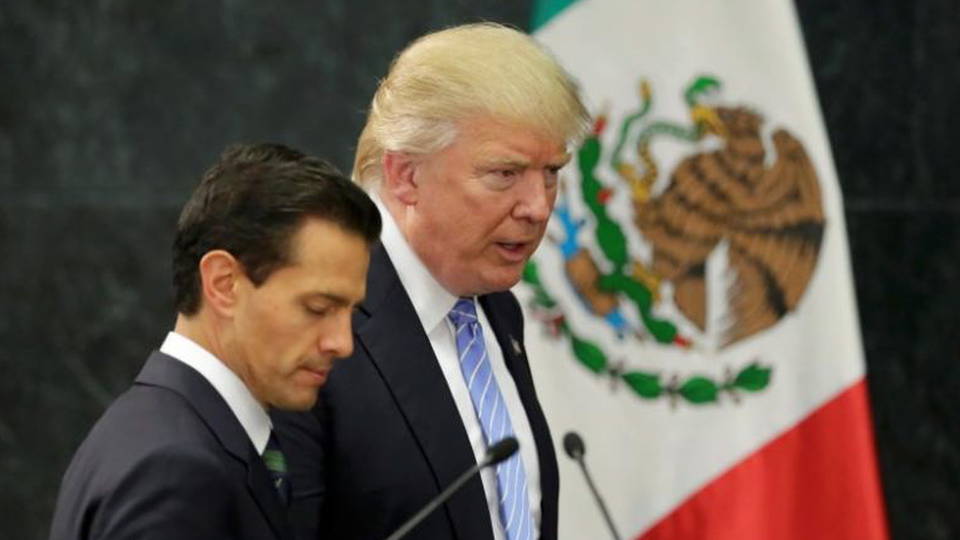 In a major speech on immigration in Phoenix, Arizona, Republican presidential nominee Donald Trump vowed to build a massive wall along the Mexican border and to begin deporting millions of immigrants as soon as he takes office, if elected in November. During the speech, he vowed to deport 2 million people within his first hour in office. Trump has made the mass deportation of 11 million undocumented immigrants one of the cornerstone proposals of his campaign. Donald Trump spoke in Phoenix just hours after meeting in Mexico City with Mexican President Enrique Peña Nieto. Trump has sparked outrage among Mexicans by calling them "rapists" and "criminals." Mexican President Enrique Peña Nieto has fiercely criticized Trump in the past, once comparing him to Adolf Hitler and Benito Mussolini.
In a major speech on immigration in Phoenix, Arizona, Republican presidential nominee Donald Trump vowed to build a massive wall along the Mexican border and to begin deporting millions of immigrants as soon as he takes office, if elected in November. During the speech, he vowed to deport 2 million people within his first hour in office. Trump has made the mass deportation of 11 million undocumented immigrants one of the cornerstone proposals of his campaign. Donald Trump spoke in Phoenix just hours after meeting in Mexico City with Mexican President Enrique Peña Nieto. Trump has sparked outrage among Mexicans by calling them "rapists" and "criminals." Mexican President Enrique Peña Nieto has fiercely criticized Trump in the past, once comparing him to Adolf Hitler and Benito Mussolini.Hundreds Protest Trump Visits to Arizona and Mexico
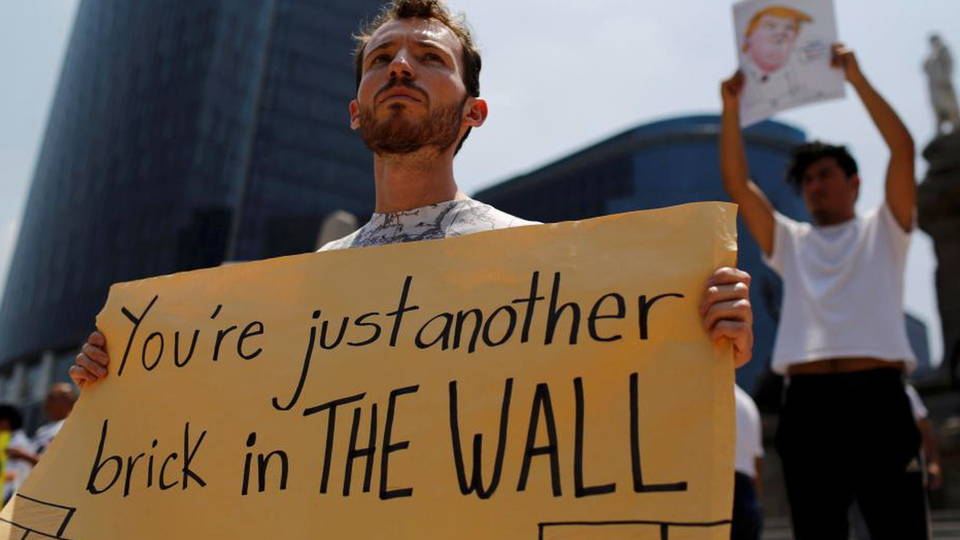 Trump was met by protesters both in Phoenix and in Mexico. In Phoenix, activists gathered outside the Phoenix Convention Center carrying a massive inflated balloon of Donald Trump with a swastika on his jacket. The rally was dubbed "Our Culture Trumps Their Hate" and featured Mexican and indigenous dance performances. In Mexico, activists gathered in downtown Mexico City to protest Trump’s visit and his proposal to build a wall across the entire length of the border. The U.S. already spends billions on border security every year. This is one of the protesters.
Trump was met by protesters both in Phoenix and in Mexico. In Phoenix, activists gathered outside the Phoenix Convention Center carrying a massive inflated balloon of Donald Trump with a swastika on his jacket. The rally was dubbed "Our Culture Trumps Their Hate" and featured Mexican and indigenous dance performances. In Mexico, activists gathered in downtown Mexico City to protest Trump’s visit and his proposal to build a wall across the entire length of the border. The U.S. already spends billions on border security every year. This is one of the protesters.Maya Ghazzen: "Well, there’s already a border wall, and, I mean, that mainly affects the most marginalized sectors of the Mexican society. And instead of building community and comprehension and programs to develop the relationship between our two people, it’s putting walls between us, just like they do in Palestine-Israel. And I think it’s very important, the wall, because the same company—and I have to talk about companies because the people who profit from this hate speech are companies and transnationals. So, G4S runs our security, security, our separation wall between Mexico and the U.S., and Palestine-Israel."
We’ll go to Mexico City and to Phoenix, Arizona, for more on Trump’s speech and his visit after headlines.
Phoenix Approves City ID Cards for Undocumented Immigrants
Trump’s visit came the same day the Phoenix City Council voted to approve ID cards for all Phoenix residents—including people who are undocumented. The move follows similar initiatives in New York City and Los Angeles.
Leaked Memo Tells Democrats How to Deal with Black Lives Matter
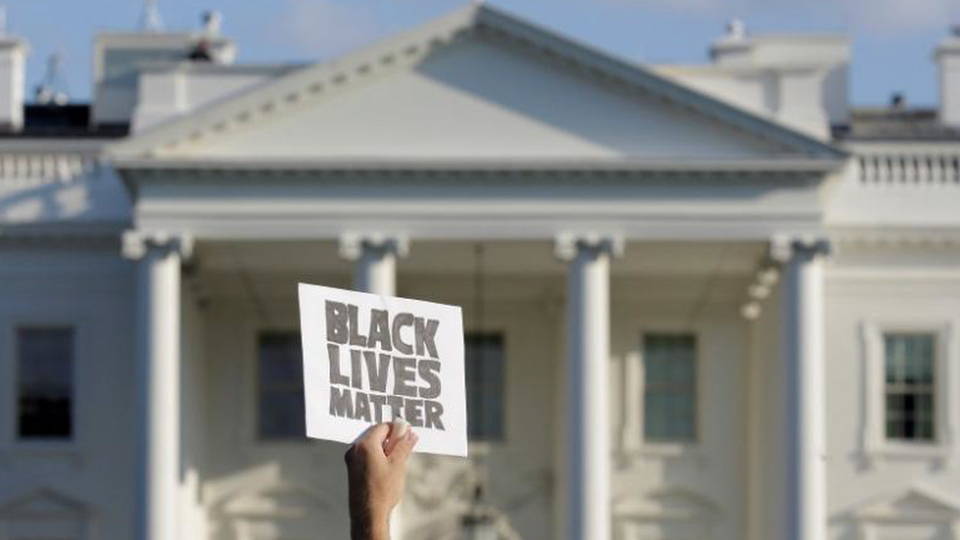 In more campaign news, a leaked memo from 2015 shows a Democratic Congressional Campaign Committee staffer instructing Democratic candidates on how to deal with Black Lives Matter activists. The memo calls Black Lives Matter a "radical movement" and tells candidates, "Don’t offer support for concrete policy positions." The memo was posted online by Guccifer 2.0, a hacker who has claimed to be behind the hack of 20,000 DNC emails that were leaked by WikiLeaks in July. Guccifer 2.0 says the memo came from House Minority Leader Nancy Pelosi’s personal computer. Pelosi’s office has not commented on the memo.
In more campaign news, a leaked memo from 2015 shows a Democratic Congressional Campaign Committee staffer instructing Democratic candidates on how to deal with Black Lives Matter activists. The memo calls Black Lives Matter a "radical movement" and tells candidates, "Don’t offer support for concrete policy positions." The memo was posted online by Guccifer 2.0, a hacker who has claimed to be behind the hack of 20,000 DNC emails that were leaked by WikiLeaks in July. Guccifer 2.0 says the memo came from House Minority Leader Nancy Pelosi’s personal computer. Pelosi’s office has not commented on the memo.Brazilian Senate Votes to Impeach President Dilma Rousseff
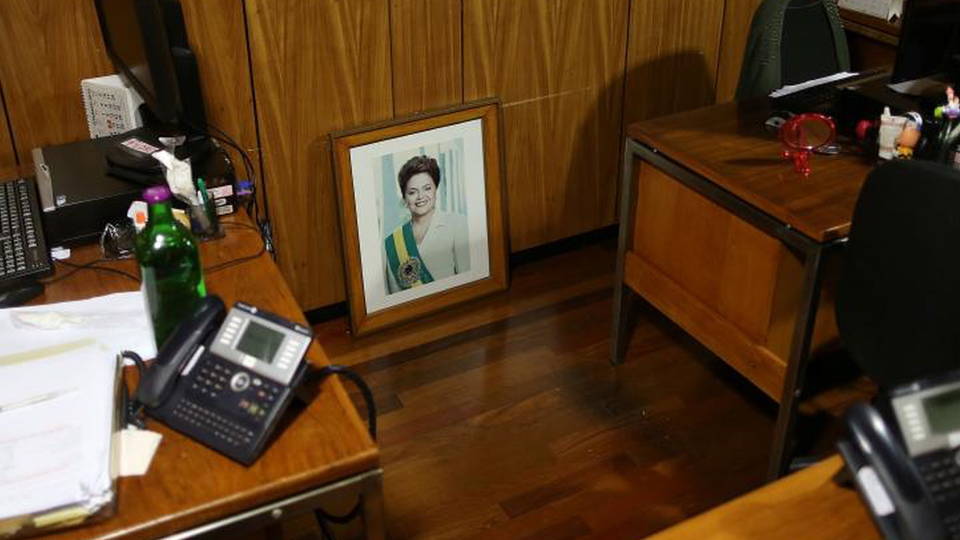 The Brazilian Senate has voted to impeach the country’s democratically elected President Dilma Rousseff from office in what many are calling a coup by her right-wing political rivals. The vote was 61 to 20. Rousseff’s impeachment ends 13 years of the left-wing Workers’ Party rule in Brazil and brings to power President Michel Temer for the remaining two years of Rousseff’s term. Temer is deeply unpopular and currently under investigation himself, accused of receiving illegal campaign contributions linked to the state oil company Petrobras.
The Brazilian Senate has voted to impeach the country’s democratically elected President Dilma Rousseff from office in what many are calling a coup by her right-wing political rivals. The vote was 61 to 20. Rousseff’s impeachment ends 13 years of the left-wing Workers’ Party rule in Brazil and brings to power President Michel Temer for the remaining two years of Rousseff’s term. Temer is deeply unpopular and currently under investigation himself, accused of receiving illegal campaign contributions linked to the state oil company Petrobras.U.S. and Cuba Resume Direct Flights After 50 Years
 The first direct commercial flight between the U.S. and Cuba in more than 50 years touched down in Santa Clara, Cuba, Wednesday. JetBlue Flight 387 took off from Fort Lauderdale, Florida. Also on Wednesday, U.S. Transportation Secretary Anthony Foxx met with Cuban Foreign Minister Bruno Rodríguez. The meeting and the flight were the latest steps in the thawing ties between Cuba and the United States.
The first direct commercial flight between the U.S. and Cuba in more than 50 years touched down in Santa Clara, Cuba, Wednesday. JetBlue Flight 387 took off from Fort Lauderdale, Florida. Also on Wednesday, U.S. Transportation Secretary Anthony Foxx met with Cuban Foreign Minister Bruno Rodríguez. The meeting and the flight were the latest steps in the thawing ties between Cuba and the United States.Yemen: U.S.-Backed, Saudi-Led Airstrike Kills 16 Members of Family
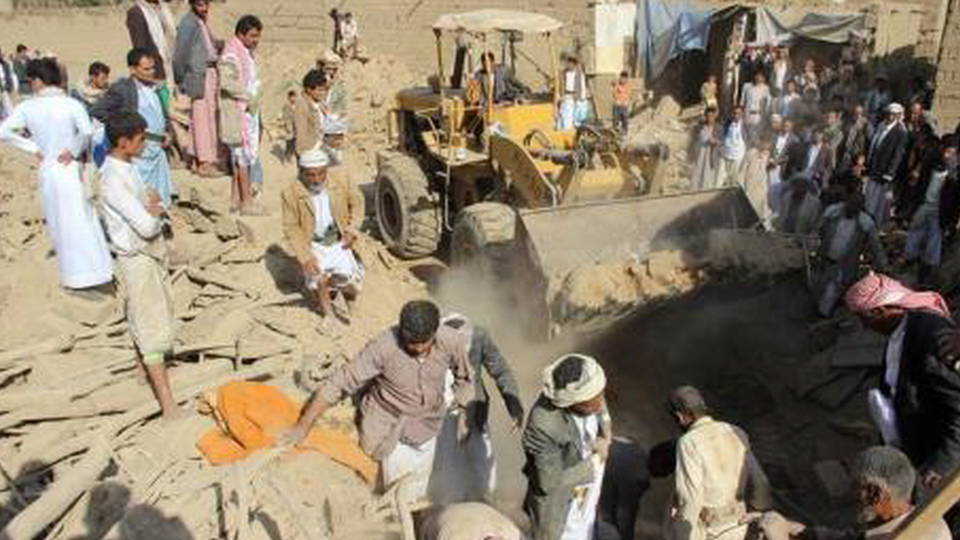 In Yemen, a U.S.-backed, Saudi-led airstrike has killed at least 16 people when it struck the home of an imam in Saada Wednesday. Local residents say the strike killed the imam’s extended family, including at least one child. This comes as the U.N. humanitarian coordinator told the U.N. Security Council at least 10,000 civilians have died or been wounded in the 18-month conflict. Last week, U.S. Secretary of State John Kerry traveled to Saudi Arabia and met with the Saudi foreign minister, where he urged a "political solution" to the war in Yemen. The U.S. continues to supply Saudi Arabia with billions of dollars of weapons. These sales have reportedly included internationally banned cluster bombs, which are designed to fan out over a wide area and often fail to explode, posing a massive risk to civilians.
In Yemen, a U.S.-backed, Saudi-led airstrike has killed at least 16 people when it struck the home of an imam in Saada Wednesday. Local residents say the strike killed the imam’s extended family, including at least one child. This comes as the U.N. humanitarian coordinator told the U.N. Security Council at least 10,000 civilians have died or been wounded in the 18-month conflict. Last week, U.S. Secretary of State John Kerry traveled to Saudi Arabia and met with the Saudi foreign minister, where he urged a "political solution" to the war in Yemen. The U.S. continues to supply Saudi Arabia with billions of dollars of weapons. These sales have reportedly included internationally banned cluster bombs, which are designed to fan out over a wide area and often fail to explode, posing a massive risk to civilians.U.S. Arms Manufacturer to Stop Making Cluster Bombs
This comes as the U.S. weapons manufacturer Textron Systems has announced it will stop manufacturing cluster bombs, citing the "current political environment." Human Rights Watch has documented Textron’s cluster bombs being used by Saudi Arabia in the war in Yemen. Textron’s decision to stop making these munitions comes after years of pressure from activist groups, including from the Cluster Munition Coalition.
Kashmir: Indian Security Forces Kill 1 Protester; Hundreds More Blinded
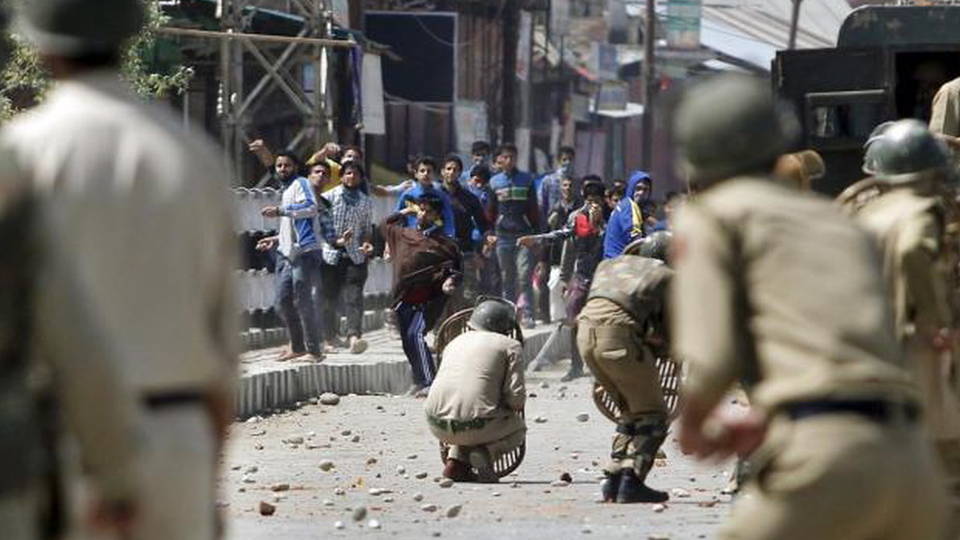 In Kashmir, Indian security forces have killed another protester, 18-year-old Danish Ahmad, who was shot to death by Indian troops for throwing rocks at an army convoy. It’s at least the 70th confirmed death in Kashmir since anti-India protests erupted on July 8, after Indian security forces killed a prominent Kashmiri independence leader. Hundreds more Kashmir residents have been blinded by lead pellets shot by Indian security forces. Doctors at the main hospital say they’ve seen at least 570 patients whose eyes have been mutilated by the lead pellets. Ophthalmologists are calling the condition "dead eyes." This is one of the patients, Fayaz Ahmad.
In Kashmir, Indian security forces have killed another protester, 18-year-old Danish Ahmad, who was shot to death by Indian troops for throwing rocks at an army convoy. It’s at least the 70th confirmed death in Kashmir since anti-India protests erupted on July 8, after Indian security forces killed a prominent Kashmiri independence leader. Hundreds more Kashmir residents have been blinded by lead pellets shot by Indian security forces. Doctors at the main hospital say they’ve seen at least 570 patients whose eyes have been mutilated by the lead pellets. Ophthalmologists are calling the condition "dead eyes." This is one of the patients, Fayaz Ahmad.Fayaz Ahmad: "We were a peaceful group of people who did not protest or take part in a procession, when a group of police and Central Reserve Police Force personnel approached us and started firing pellets and tear gas without asking any questions. At least 20 to 25 people were injured. We were taken to a local hospital, from where we were referred to another hospital. On our way there, police and the Central Reserve Police Force personnel took us out of the ambulance and beat us up."
Divided Supreme Court Blocks North Carolina Voter ID Laws
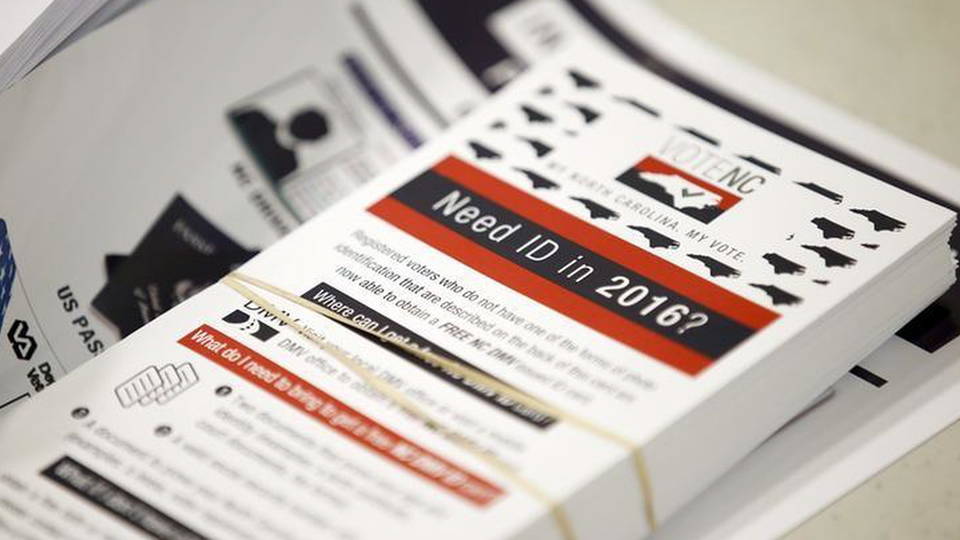 A divided Supreme Court has refused to reinstate parts of North Carolina’s restrictive voter ID laws, which were blocked last month after a court ruled the measures discriminated against African Americans and targeted them "with almost surgical precision." The 4-4 decision means up to 5 percent of the state’s registered voters targeted by the law can now vote in the general election.
A divided Supreme Court has refused to reinstate parts of North Carolina’s restrictive voter ID laws, which were blocked last month after a court ruled the measures discriminated against African Americans and targeted them "with almost surgical precision." The 4-4 decision means up to 5 percent of the state’s registered voters targeted by the law can now vote in the general election.ND: 2 Stop Dakota Access Construction by Locking Bodies to Machines
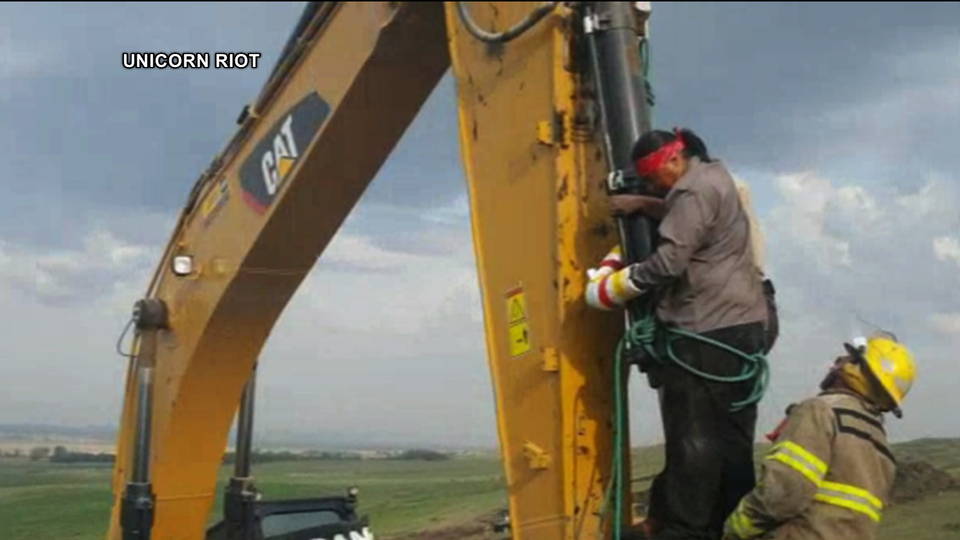 In North Dakota, eight people were arrested after two people locked themselves to heavy machinery to block construction of the $3.8 billion Dakota Access pipeline, which would carry 500,000 barrels of crude from the Bakken oilfields of North Dakota through South Dakota, Iowa and into Illinois. It took the police hours to remove Dale American Horse Jr., who was locked to an excavator.
In North Dakota, eight people were arrested after two people locked themselves to heavy machinery to block construction of the $3.8 billion Dakota Access pipeline, which would carry 500,000 barrels of crude from the Bakken oilfields of North Dakota through South Dakota, Iowa and into Illinois. It took the police hours to remove Dale American Horse Jr., who was locked to an excavator.Iowa: 30 Arrested Blocking Dakota Access Pipeline Construction
Meanwhile, 30 people were arrested in Iowa in an effort to block construction of the Dakota Access pipeline there. And in Texas, members of the group Anti-Colonialists Against Billionaires say they poured superglue into the locks on the doors of the corporate offices of Energy Transfer Partners in Dallas before dawn on Wednesday.
2 Mississippi Universities Lower State Flag over Confederate Emblem
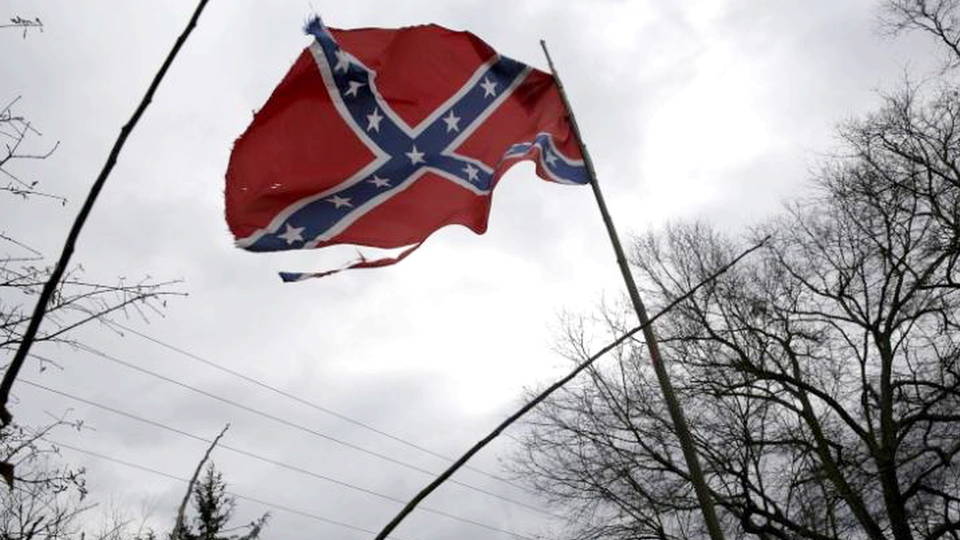 Two more universities have taken steps to remove Confederate imagery and emblems from campus. Mississippi State University and the Mississippi University for Women both have decided to remove the state flag because it includes the Confederate battle emblem in the upper left corner. In total, seven Mississippi public universities have removed the state flag from their campuses, leaving only one, Delta State University, left with the flag still flying with the Confederate emblem.
Two more universities have taken steps to remove Confederate imagery and emblems from campus. Mississippi State University and the Mississippi University for Women both have decided to remove the state flag because it includes the Confederate battle emblem in the upper left corner. In total, seven Mississippi public universities have removed the state flag from their campuses, leaving only one, Delta State University, left with the flag still flying with the Confederate emblem.Chicago: Police Move to Fire 5 Officers over Laquan McDonald Killing
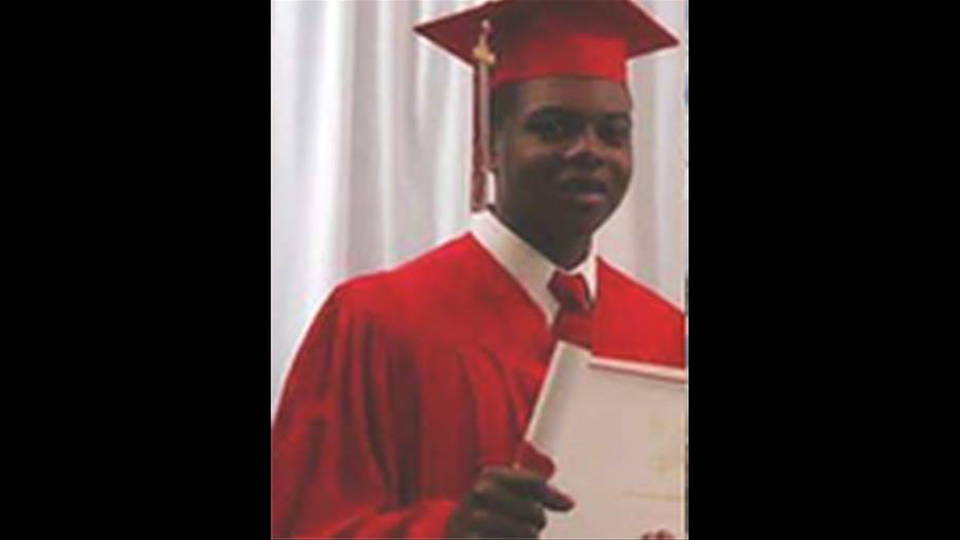 In Chicago, Police Superintendent Eddie Johnson says he’s moving to fire five officers over the fatal shooting of 17-year-old African American Laquan McDonald, who was shot 16 times in October 2014 by white police officer Jason Van Dyke. An inspector general report issued two weeks ago recommended the Chicago Police Department fire 10 officers. Superintendent Johnson had previously said he’d move to fire seven officers. Now he says he’s moving to fire five—Officer Van Dyke and four others who are accused of lying during the investigation of the shooting. Van Dyke has been charged with first-degree murder.
In Chicago, Police Superintendent Eddie Johnson says he’s moving to fire five officers over the fatal shooting of 17-year-old African American Laquan McDonald, who was shot 16 times in October 2014 by white police officer Jason Van Dyke. An inspector general report issued two weeks ago recommended the Chicago Police Department fire 10 officers. Superintendent Johnson had previously said he’d move to fire seven officers. Now he says he’s moving to fire five—Officer Van Dyke and four others who are accused of lying during the investigation of the shooting. Van Dyke has been charged with first-degree murder.22 Immigrant Mothers Resume Hunger Strike at Berks Detention Center
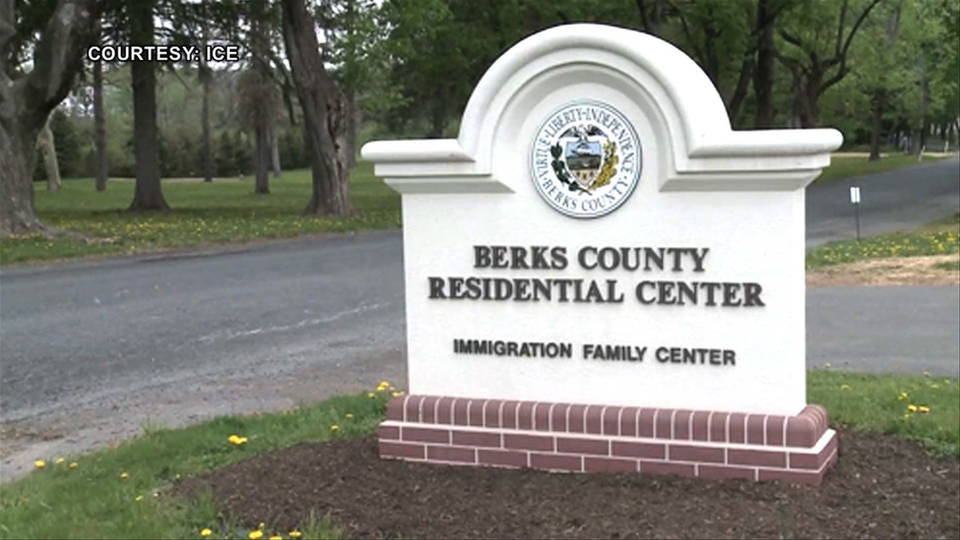 And in Pennsylvania, 22 immigrant mothers have resumed their hunger strike at the Berks County Residential Center after suspending the strike for a week, citing intimidation by ICE officials. The mothers first launched the strike on August 8 to protest Department of Homeland Security Secretary Jeh Johnson’s claims that the average time in family detention is only 20 days. As of today, at least three families will have spent a full year in custody at the Berks facility. This is Margarita.
And in Pennsylvania, 22 immigrant mothers have resumed their hunger strike at the Berks County Residential Center after suspending the strike for a week, citing intimidation by ICE officials. The mothers first launched the strike on August 8 to protest Department of Homeland Security Secretary Jeh Johnson’s claims that the average time in family detention is only 20 days. As of today, at least three families will have spent a full year in custody at the Berks facility. This is Margarita.
Margarita: "We are here for one year. We are desperate, really, because it’s traumatic to spend so much time here. So, my son tries to, with his ID, strike around his neck. So, I was worried of him. The psychologist said that he’s going to be OK, that it’s just frustration that he have, but I don’t think that was just frustration, because it’s something more delicate."
-------
Donate today:
Follow:



COLUMN
-------
Donate today:
Follow:




COLUMN

"In Post-Olympics Brazil, a Political Coup is No Game" by Amy Goodman & Denis Moynihan
The Olympic torch in Rio de Janeiro has been extinguished, and the global spotlight has left Brazil. In the shadow of the games, an extraordinary event has taken place, largely ignored in the U.S. media: a coup d’etat against Brazil’s democratically elected president, Dilma Rousseff. Brazil is the fifth-most populous country in the world, with one of its largest economies. Like many Latin American nations, it suffered under a military dictatorship for decades, emerging as a young democracy only 30 years ago. This week’s coup was not carried out by the military, but by the Brazilian Senate. The effect is essentially the same: the president has been impeached, and an unpopular political opponent, Michel Temer, who represents that country’s wealthy elites, has assumed the presidency.
In 1964, the Brazilian military staged a coup against another democratically elected president. After the coup, Dilma Rousseff, as a young woman, joined an armed guerrilla group to fight against the military dictatorship. She was arrested in 1970, and repeatedly tortured during her more than two years of imprisonment. After her release, she remained politically active, but outside the armed resistance movement. The dictatorship met its eventual demise in 1985 with the return of an elected government.
Years later, in 2014, U.S. Vice President Joe Biden, on a visit to Brazil to attend the World Cup soccer tournament, hand-delivered 43 U.S. government documents that detailed the depth of U.S. knowledge of the military dictatorship’s widespread use of torture and assassination against Brazilians. The U.S. government continued to support the dictatorship in Brazil, as it did in Argentina and other Latin American countries.
In 2003, the people of Brazil elected as president Luiz Inacio Lula da Silva, known as “Lula,” a member of the leftist Workers’ Party. He served two terms, and was replaced by his preferred successor, the first woman president of Brazil, Dilma Rousseff. The Workers’ Party under both presidents had implemented significant and effective social programs to help alleviate Brazil’s systemic poverty and inequality. It is this confluence of social-program spending and a slowing economy that opened Dilma up to what has been described as a “parliamentary coup.”
Pulitzer Prize-winning journalist Glenn Greenwald is a keen observer of Brazilian politics. He lives in Rio de Janeiro. On the “Democracy Now!” news hour, Greenwald told us:
“The formal charge against her that they’re using to justify impeachment in Portuguese is called pedaladas, which really means pedaling ... a budgetary maneuver where the government borrows money from a state bank and then delays repayment in order to make it appear that the government owes less money. So she’s essentially accused of using budgetary tricks to make the state of the government budget look better in order to win re-election — something that when you talk to Europeans or Americans, they react with befuddlement that something like that could justify the removal of a democratically elected president, given that that’s extremely common for political leaders around the world to do, and, in fact, prior Brazilian presidents have used this same method.”
The lower house of Congress voted to impeach Dilma last April, and the Senate then began proceedings. She was suspended during the deliberations, replaced by Michel Temer as interim president. “During the Olympics,” Glenn Greenwald noted, “Mr. Temer broke protocol by demanding that his name not be announced at the opening ceremony, because he was scared of being booed by the crowd. That’s how unpopular and hated he is. And yet ... they did boo him, quite viciously.”
On Wednesday, Aug. 31, the Brazilian Senate formally voted, 60 to 21, to impeach Dilma. Remarkably, most of those who voted to oust her are themselves currently under investigation for corruption. As one secretly recorded conversation confirms, the likely reason that the Senate sought to impeach Dilma was to quash all the ongoing corruption investigations against sitting senators and members of Congress.
Dilma marched out and, surrounded by supporters, denounced the proceedings: “This is the second coup I have faced in life. The first, the military coup, supported by weapons of repression and torture, struck me as a young militant. The second parliamentary coup that unfolded today through a legal farce knocks me from the position for which I was elected by the people.”
Brazil is a remarkable country, with more than 200 million people, a vibrant culture, a huge economy and, with the majority of the threatened Amazon rainforest within its borders, a vital role to play in the fight to limit human-induced climate change. With all the challenges before them, the people of Brazil deserve a swift repudiation of this coup, by all governments, but most importantly by President Barack Obama and those presidential candidates who aspire to replace him.
NEW BOOK

Senior TV Producer
207 West 25th Street, 11th Floor,
New York, New York 10001, United States
-------
-------

No comments:
Post a Comment